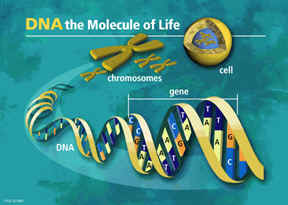From the probably hundreds of times: “Science has proven evolution is fact.” It’s like a strange Darwinian chant that emanates from atheist blogs and secular universities. Too bad (for them) it’s not true.
In fact, refuting evolution doesn’t require complicated equations or lab experiments—though those do the job, too. Just remember the two fundamental flaws we can use to show evolution to be, well, not even scientifically viable.
Where’d You Get Your Information, Bub?
 Everything that makes up your body requires genetic information. You’ve got hands and feet because your genes code for it. The same is true for any creature—dogs, camels, you name it.
Everything that makes up your body requires genetic information. You’ve got hands and feet because your genes code for it. The same is true for any creature—dogs, camels, you name it.
The genetic information in humans varies from the information in animals, plants, and so on. Seems obvious, so why point it out? Because for animal kind A to somehow “presto-change-o” into animal kind B, the information’s got to change. A fish doesn’t just morph into an amphibian without something changing in the genes. It would have to gain some new information.
Here’s the clincher: when we use operational science—the kind involving observable, repeatable, testable results—we have never observed, repeated, or been able to test animal kind A turning into animal kind B—at all. Sure, there’s some genetic “do-si-do” going on through mutations and gene drift, but there’s no way fish are going to sprout hair and opposable thumbs. Just in case you think by “no way” we mean there’s still a chance, there’s not—none, zilch, nada, not going to happen. What if we add billions of years and cool artistic renderings? Still no.
Original Recipe
That first point is devastating enough. But here’s how evolution gets buried even more.
Continue reading

 Roman Catholicism has a gospel that does not give peace, because it fundamentally violates the Scriptural teaching on how one is made right with God. Rome has a false gospel that cannot save, hence, I have no reason to abandon the peace I have with God through Christ’s perfect atonement for the treadmill of Rome’s sacramental system of salvation… the person who has embraced the gospel of grace has not only landed his boat on the far side [of the Tiber River], but has torn the boat apart to use the wood as a pulpit from which to proclaim freedom in Christ to those trapped on the other shore. – Dr. James White
Roman Catholicism has a gospel that does not give peace, because it fundamentally violates the Scriptural teaching on how one is made right with God. Rome has a false gospel that cannot save, hence, I have no reason to abandon the peace I have with God through Christ’s perfect atonement for the treadmill of Rome’s sacramental system of salvation… the person who has embraced the gospel of grace has not only landed his boat on the far side [of the Tiber River], but has torn the boat apart to use the wood as a pulpit from which to proclaim freedom in Christ to those trapped on the other shore. – Dr. James White We live in the age of sound bites. Unless a speech is carried live by the television networks, it is condensed to a 5 or 10 second excerpt on a news program (and the words we do hear are often taken out of context). There is no doubt that culturally speaking, our attention span has suffered because of this. The networks are not the only ones to blame here for they are simply giving the people want they want. People want “just the facts” not all the various nuances and subtleties.
We live in the age of sound bites. Unless a speech is carried live by the television networks, it is condensed to a 5 or 10 second excerpt on a news program (and the words we do hear are often taken out of context). There is no doubt that culturally speaking, our attention span has suffered because of this. The networks are not the only ones to blame here for they are simply giving the people want they want. People want “just the facts” not all the various nuances and subtleties. “Biblically, the difference between these two conceptions of how God in love relates to fallen human beings may be pinpointed thus. Arminianism treats our Lord’s parable of the Supper to which further guests were invited in place of those who never came (Luke 14:16-24; cf. Matt. 22:1-10) as picturing the whole truth about the love of God in the gospel. On this view, when you have compared God’s relation to fallen men with that of a dignitary who invites all needy folk around to come and enjoy his bounty, you have said it all. Calvinism, however, does not stop here, but links with the picture of the Supper that of the Shepherd (John 10:11-18, 24-29) who has his sheep given him to care for (vv. 14, 16, 27; cf. 6:37-40; 17:6, 11f.), who lays down his life for them (10:15), who guarantees that all of them will in due course hear his voice (vv. 16, 27) and follow him (v. 27), and be kept from perishing forever (v. 28). In other words, Calvinism holds that divine love does not stop short at graciously inviting, but that the triune God takes gracious action to ensure that the elect respond. On this view, both the Christ who saves and the faith which receives him as Savior are God’s gifts, and the latter is as much a foreordained reality as is the former. Arminians praise God for providing a Savior to whom all may come for life; Calvinists do that too, and then go on to praise God for actually bringing them to the Savior’s feet.
“Biblically, the difference between these two conceptions of how God in love relates to fallen human beings may be pinpointed thus. Arminianism treats our Lord’s parable of the Supper to which further guests were invited in place of those who never came (Luke 14:16-24; cf. Matt. 22:1-10) as picturing the whole truth about the love of God in the gospel. On this view, when you have compared God’s relation to fallen men with that of a dignitary who invites all needy folk around to come and enjoy his bounty, you have said it all. Calvinism, however, does not stop here, but links with the picture of the Supper that of the Shepherd (John 10:11-18, 24-29) who has his sheep given him to care for (vv. 14, 16, 27; cf. 6:37-40; 17:6, 11f.), who lays down his life for them (10:15), who guarantees that all of them will in due course hear his voice (vv. 16, 27) and follow him (v. 27), and be kept from perishing forever (v. 28). In other words, Calvinism holds that divine love does not stop short at graciously inviting, but that the triune God takes gracious action to ensure that the elect respond. On this view, both the Christ who saves and the faith which receives him as Savior are God’s gifts, and the latter is as much a foreordained reality as is the former. Arminians praise God for providing a Savior to whom all may come for life; Calvinists do that too, and then go on to praise God for actually bringing them to the Savior’s feet.
 From the preface John Calvin wrote for Pierre Robert Olivétan’s French translation of the New Testament (1534)
From the preface John Calvin wrote for Pierre Robert Olivétan’s French translation of the New Testament (1534) Matthew 22:1 And again Jesus spoke to them in parables, saying, 2 “The kingdom of heaven may be compared to a king who gave a wedding feast for his son, 3 and sent his servants to call those who were invited to the wedding feast, but they would not come. 4 Again he sent other servants, saying, ‘Tell those who are invited, See, I have prepared my dinner, my oxen and my fat calves have been slaughtered, and everything is ready. Come to the wedding feast.’ 5 But they paid no attention and went off, one to his farm, another to his business, 6 while the rest seized his servants, treated them shamefully, and killed them. 7 The king was angry, and he sent his troops and destroyed those murderers and burned their city. 8 Then he said to his servants, ‘The wedding feast is ready, but those invited were not worthy. 9 Go therefore to the main roads and invite to the wedding feast as many as you find.’ 10 And those servants went out into the roads and gathered all whom they found, both bad and good. So the wedding hall was filled with guests.
Matthew 22:1 And again Jesus spoke to them in parables, saying, 2 “The kingdom of heaven may be compared to a king who gave a wedding feast for his son, 3 and sent his servants to call those who were invited to the wedding feast, but they would not come. 4 Again he sent other servants, saying, ‘Tell those who are invited, See, I have prepared my dinner, my oxen and my fat calves have been slaughtered, and everything is ready. Come to the wedding feast.’ 5 But they paid no attention and went off, one to his farm, another to his business, 6 while the rest seized his servants, treated them shamefully, and killed them. 7 The king was angry, and he sent his troops and destroyed those murderers and burned their city. 8 Then he said to his servants, ‘The wedding feast is ready, but those invited were not worthy. 9 Go therefore to the main roads and invite to the wedding feast as many as you find.’ 10 And those servants went out into the roads and gathered all whom they found, both bad and good. So the wedding hall was filled with guests.
 Over the last two weeks, my friend, Dr. James White has preached four sermons on this tremendous passage of Scripture (above). They contain extremely rich and powerful insights into what the cross of Christ actually accomplished for the people of God. Knowing these things is the necessary antidote to so much false religion that masquerades under the banner and guise of Christianity in our day.
Over the last two weeks, my friend, Dr. James White has preached four sermons on this tremendous passage of Scripture (above). They contain extremely rich and powerful insights into what the cross of Christ actually accomplished for the people of God. Knowing these things is the necessary antidote to so much false religion that masquerades under the banner and guise of Christianity in our day. Dr. Boettner was a graduate of Princeton Theological Seminary (Th.B., 1928; Th.M., 1929), where he studied Systematic Theology under the late Dr. C. W. Hodge. In 1933 he received the honorary degree of Doctor of Divinity, and in 1957 the degree of Doctor of Literature.
Dr. Boettner was a graduate of Princeton Theological Seminary (Th.B., 1928; Th.M., 1929), where he studied Systematic Theology under the late Dr. C. W. Hodge. In 1933 he received the honorary degree of Doctor of Divinity, and in 1957 the degree of Doctor of Literature.